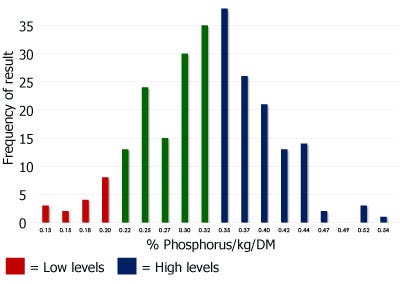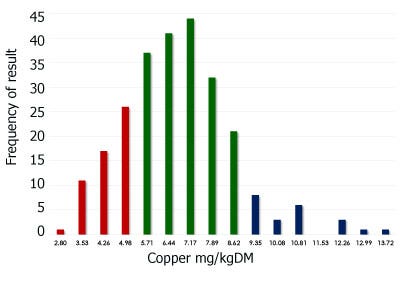
Silage variability demonstrates the need to act this winter
The variability of this year’s silage analyses highlights the need to review the dietary balance and mineral requirement of your herd on-farm.
Rumen balance is key to achieving forage digestion, yet many of this year’s silages are a cause for concern.
Rumen fermentable protein (RFP) and total fermentable protein (TFP) levels are particularly low, according to Dr Robin Hawkey, Senior Nutritionist. “This raises some major flags over rumen function,” he says. RFP and TFP are needed to promote rumen function, maximise nitrogen efficiencies and optimise the production of microbial protein.
The cutting date also impacted silage dry matters, with early cuts tending to be lower in fibre, wetter and more acidic, whilst later first cuts are higher in fibre, drier and more alkaline. Wetter, more acidic silages will need to be buffered to prevent acidosis (see Combi-BUF™, X1-LIVE™ and X2-DUAL™ yeast section on the adjacent page).
Forage mineral analysis is also highlighting some costly issues. Results show a wide variation in phosphorus levels (see chart 1 below). Low levels need careful supplementation. Phosphorus is not cheap (currently circa £30/tonne of minerals for every 1% on the mineral label), so it is wise to check you are not oversupplying it.
Chart 1: 1st cut silages 2021 - Range of phosphorus levels


If you don’t measure it, you cannot manage it!
By analysing the silage for minerals, we can perform a Nutri-LINK® Mineral Check on your ration. The key message (see charts) is not just about the levels but more importantly, the huge variability. Identifying your levels will allow you to know whether to save or supplement.
Responsible Mineral Nutrition
The mineral team at Mole Valley Feed Solutions can help ensure the mineral balance and supply to your animals are appropriate. Critically, this is not about feeding more minerals, in fact in many cases we can save you money.
A key concern is over-supply. Dr Nigel Kendall (School of Veterinary Medicine and Science, University of Nottingham) published findings from 500+ cull cows sampled in 2017, reporting concerns of trace element levels in the livers sampled.
Working with Dr Kendall, Mole Valley Farmers conducted a second study to ascertain liver copper concentrations within the UK dairy herd, using abattoir cull cow samples. The cull cows came from herds fed compound and silage in the traditional way; robot fed dairies and full TMR systems. Samples were taken from 120 cull cows from
23 farms stretching from Cornwall to Scotland and analysed at the University of Nottingham’s laboratory.
The Research highlighted:
• Excess copper identified in 73.5% of the cows. In 2012, cases of chronic copper poisoning were reported as increasing, (Bidewell et al), so over-supply is nothing new to the industry
• Selenium - 40% of the cows ‘above normal to high’
• Manganese - below normal levels in 54% of the cows.
At Mole Valley Farmers we can arrange for liver biopsies to be done on a group of cull cows from your herd to assess liver status. All you need to do is get in touch (details below).
One of the key reasons for over supply is the contribution from multiple sources in the ration including:
• The ration itself • Buckets and or blocks
• Boluses • Mineralised cake or blend.
• Minerals
Only one reliable and accurate source is required to meet the requirements of a dairy cow. The silage analysis below (chart 2) indicates some concerning levels in some silages.
Chart 2: 1st cut silages 2021 - Range of copper levels


As you know, potassium (K) in high levels can have a negative effect on magnesium availability increasing risk of staggers and can have a significant impact on Dietary Cation Anion Balance (DCAB) levels for dry cows and the incidence of milk fever. A review of dry cow silages could flag some challenges we can help you address.
Chart 3: 1st cut silages 2021 - Range of potassium levels


We are here to support your business. Please contact your local nutritionist or call the Mineral Line on 01278 420481 or email [email protected] now
for a free silage analysis and mineral check.









